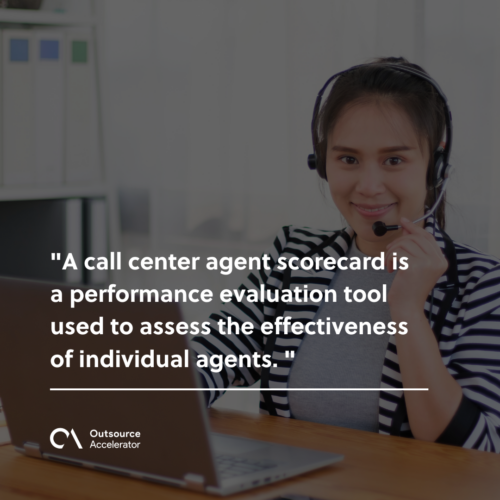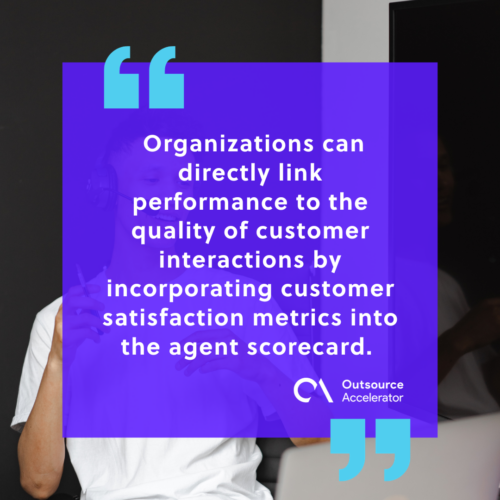How to create a call center agent scorecard

Measuring agent performance in the call center setting is crucial for ensuring exceptional customer service delivery.
An effective call center agent scorecard provides a structured framework for this purpose. Creating one is akin to crafting a compass that guides agents’ performance, ensuring alignment with organizational goals and customer satisfaction.
In this article, we dissect what makes a call center agent scorecard, explaining the process by outlining a step-by-step guide.
What is a call center agent scorecard?
A call center agent scorecard is a performance evaluation tool used to assess the effectiveness of individual agents. It typically includes a set of key performance indicators (KPIs) that measure various aspects of performance.
In terms of measuring customer experience, it’s similar to a QA scorecard.
Utilizing an agent scorecard provides a standardized way to evaluate and track work. It allows managers to:
- Identify areas for improvement
- Provide targeted coaching
- Optimize customer service delivery
The call center agent scorecard acts as a valuable tool for both performance management and continuous development.

Components of a call center agent scorecard
A well-structured call center agent scorecard comprises several components that collectively provide a holistic view of an agent’s performance.
While the specific components may vary by organization, the following are commonly included:
- Call quality – This measures the agent’s ability to handle calls efficiently, adhere to scripts, and maintain a polite and professional demeanor.
- Average Handling Time (AHT) – It covers talk time, hold time, and any after-call work. A lower AHT generally indicates higher efficiency, but this must be balanced with quality service.
- First Call Resolution (FCR) – FCR measures the agent’s ability to resolve issues and inquiries in the first call without requiring follow-up or escalations.
- Customer satisfaction (CSAT) – CSAT is measured from customers’ direct feedback regarding their satisfaction with the agent service they received.
- Adherence to schedule – This component monitors an agent’s attendance record, punctuality, and adherence to the assigned work schedule.
- Sales and upselling – If applicable, this component measures the agent’s ability to achieve sales targets or successfully upsell products.
- Knowledge and productivity – This evaluates an agent’s product knowledge and ability to utilize resources or systems to assist customers.
The components of a call center agent scorecard can be customized to fit the company’s goals and priorities. Regular review and refinement based on evolving business needs are recommended.
10 steps to build a call center agent scorecard
Here’s an in-depth exploration of the key steps involved in constructing a comprehensive call center agent scorecard:
1. Define objectives and goals
Clearly outline the purpose of the agent scorecard by defining specific objectives and goals. Consider what outcomes you want to achieve regarding customer satisfaction, operational efficiency, and other metrics.
These will guide the selection of your KPIs.
2. Identify Key Performance Indicators
Identify and select Key Performance Indicators directly contributing to the defined objectives. These KPIs should be measurable.
Tailor selection based on your needs and priorities.

3. Gather stakeholder input
Involve key stakeholders like call center managers, supervisors, and agents. Seek their input on the most relevant and meaningful KPIs to include in the agent scorecard.
This collaborative approach ensures that the scorecard reflects all perspectives and needs.
4. Establish weighting and prioritization
Assign weights to each KPI to reflect its relative importance. This step ensures that agents focus on the most critical aspects of their performance.
5. Define scoring criteria
Define clear criteria and benchmarks for scoring each KPI. This involves establishing what performance level corresponds to each range of scores.
For example, you can define performance levels as:
- Excellent
- Good
- Average
- Needs Improvement
This provides transparency and consistency in the evaluation process.
6. Incorporate customer feedback
Integrate mechanisms for collecting customer feedback into the agent scorecard. Customer satisfaction scores and comments can provide valuable insights into interaction quality.
7. Include qualitative assessment
Supplement quantitative metrics with qualitative assessment. You can evaluate agents based on soft skills like:
- Communication abilities
- Problem-solving skills
- Adherence to company values
8. Utilize technology
Leverage technology tools to collect and analyze data for the scorecard. Tools like performance management software and reporting dashboards enable accurate data collection.
9. Training and communication
Provide thorough training and communication to agents about the scorecard. They should understand its purpose, methodology, and expectations.
10. Pilot testing, rollout, and iterative improvement
Conduct a pilot test of the agent scorecard with a small group of agents before implementing it on a broader scale.
This allows you to identify any potential issues or improvements needed in the scorecard’s design, data collection, or scoring methodology.
Once the agent scorecard has been refined through pilot testing, roll it out to all agents. Review and adjust the scorecard regularly to reflect current business goals and industry standards.
You can build a solid call center agent scorecard that can serve as a strategic tool for enhancing overall success by following these steps.
Why you need a call center agent scorecard
A call center agent scorecard is an essential tool for several reasons:
- Performance evaluation – An agent scorecard provides a standardized method to evaluate performance consistently, allowing managers to hold agents accountable.
- Identification of training needs – By using an agent scorecard, managers can identify specific areas where agents may need additional training or coaching, allowing for targeted development efforts.
- Consistent quality – An agent scorecard allows call centers to monitor and ensure consistent quality of customer interactions and a cohesive brand image.
- Strategic decision-making – The data collected through the agent scorecard becomes a valuable resource for decision-making in resource allocation, training initiatives, and process improvement.
- Customer satisfaction – Organizations can directly link performance to the quality of customer interactions by incorporating customer satisfaction metrics into the agent scorecard.

Measuring performance with an agent scorecard
Measuring performance with a call center agent scorecard is a valuable practice for contact centers aiming to deliver exceptional service consistently.
A call center agent scorecard promotes a culture of accountability and recognition. It empowers agents to take ownership of their work and strive for excellence.
By adopting a comprehensive agent scorecard, call centers can create a customer-centric culture, improve service delivery, and drive overall success.







 Independent
Independent




